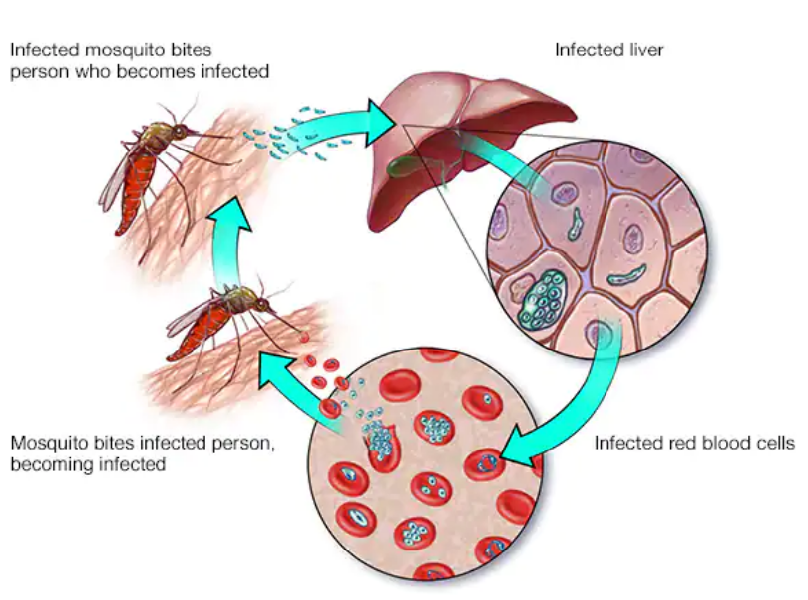
How are the symptoms of malaria different from dengue?
Answer
510k+ views
Hint: Diseases are of two types one is communicable and noncommunicable. Diseases or illness is a temporary condition of the body not functioning properly. Due to some kind of microbial invader attack or some other factors the condition can occur. Communicable diseases are one such type where it spreads from one person to another. Non-communicable is the disease which does not spread.
Complete answer:
As we discussed communicable and non-communicable diseases. Malaria and dengue both are spreadable, but not spread through person to person, but both are known as communicable diseases. Malaria is caused by a parasite. The causative organism is Plasmodium. It is a parasitic disease. The symptoms that occur in malaria are slightly different from dengue.
In both the disease fever, headache, body pain and fatigue occur. Dengue is also caused by the bite of mosquitoes. The species of mosquito which causes dengue fever is aedes mosquito, whereas malaria is spread by anopheles’ mosquito.
A Parasite's life cycle is a digenetic life cycle. It is a digenetic organism. It requires two modes for its survival. The first host it resides is a mosquito. When a mosquito sits in a person and it injects its trunk the parasite travels from the gut of the mosquito to another host which is the second host- human or any animal. In the human body the parasite travels into the liver organ and starts replicating and rupturing the RBCs in blood and inserting its genetic material. The healthy cells in the human body start to get infected. Hence showing symptoms like- fever, fatigue etc.

Note:
Preventions from communicable disease are- avoiding direct contact or using infecting persons are strictly prohibited. The organs which are affected mostly in malaria are lungs. Around twenty percent of the lungs are captured for growth of the sp. Falciparum. Parasites have four different species in order of malaria.
Complete answer:
As we discussed communicable and non-communicable diseases. Malaria and dengue both are spreadable, but not spread through person to person, but both are known as communicable diseases. Malaria is caused by a parasite. The causative organism is Plasmodium. It is a parasitic disease. The symptoms that occur in malaria are slightly different from dengue.
In both the disease fever, headache, body pain and fatigue occur. Dengue is also caused by the bite of mosquitoes. The species of mosquito which causes dengue fever is aedes mosquito, whereas malaria is spread by anopheles’ mosquito.
A Parasite's life cycle is a digenetic life cycle. It is a digenetic organism. It requires two modes for its survival. The first host it resides is a mosquito. When a mosquito sits in a person and it injects its trunk the parasite travels from the gut of the mosquito to another host which is the second host- human or any animal. In the human body the parasite travels into the liver organ and starts replicating and rupturing the RBCs in blood and inserting its genetic material. The healthy cells in the human body start to get infected. Hence showing symptoms like- fever, fatigue etc.

Note:
Preventions from communicable disease are- avoiding direct contact or using infecting persons are strictly prohibited. The organs which are affected mostly in malaria are lungs. Around twenty percent of the lungs are captured for growth of the sp. Falciparum. Parasites have four different species in order of malaria.
Recently Updated Pages
Master Class 12 Economics: Engaging Questions & Answers for Success

Master Class 12 Physics: Engaging Questions & Answers for Success

Master Class 12 English: Engaging Questions & Answers for Success

Master Class 12 Social Science: Engaging Questions & Answers for Success

Master Class 12 Maths: Engaging Questions & Answers for Success

Master Class 12 Business Studies: Engaging Questions & Answers for Success

Trending doubts
Which are the Top 10 Largest Countries of the World?

What are the major means of transport Explain each class 12 social science CBSE

Draw a labelled sketch of the human eye class 12 physics CBSE

Why cannot DNA pass through cell membranes class 12 biology CBSE

Differentiate between insitu conservation and exsitu class 12 biology CBSE

Draw a neat and well labeled diagram of TS of ovary class 12 biology CBSE




